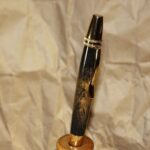
The saying, “All good things must come to an end,” is attributed to Geoffrey Chaucer, 1374 (Random House Dictionary). The phrase was originally “Everything has an end.”
Another quote, “Good things come to those who wait,” is from Lady Mary Montgomerie Currie, who wrote under her pseudonym, Violet Fane.
So, which is it? Do all good things end? Or do good things begin if we wait?
How about both? And how about relating that to our reading and our writing?
Mickey Spillane said, “The first chapter sells the book; the last chapter sells the next book.”
Maybe we could say, Good beginnings lead to good endings lead to good beginnings?
The archives here at TKZ are loaded with discussions of both beginnings and endings. Just use the search box.
Today, let’s keep the assignment simple.
For Readers: What techniques or content in the ending or last chapter of a book are most likely to make you look for another book by the same author?
For Writers: What tricks and techniques do you use in your endings to capture the reader and make them want to read your next book?
***

A thank you to readers and participants:
After several years of blogging here at TKZ, I am stepping down because of family responsibilities. This has been an incredible opportunity, and I wish to express my appreciation to all the TKZ writers who have made this possible. I also want to thank those of you who have read and commented on my blogs. Your participation has made this a high point in my writing life.
I will continue to send a monthly newsletter/blog post to those who wish to follow my writing and pen making. You can sign up on the home page of my website – https://stevehooleywriter.com/ – The newsletter will contain a Bookfunnel link to a free book, Bolt’s Story, a prequel to my Mad River Magic series, and will also provide regular opportunities to sign up for drawings to win one of my hand-crafted, legacy pens, made with antique wood.









